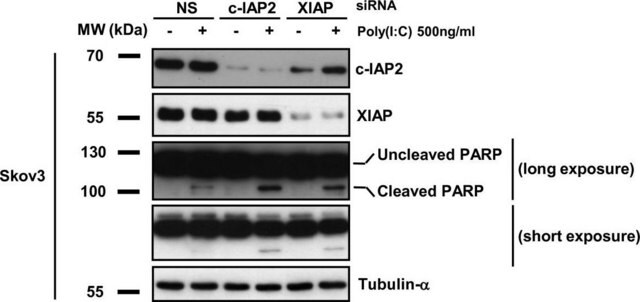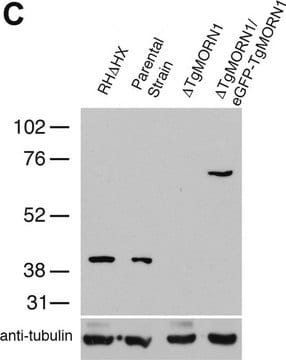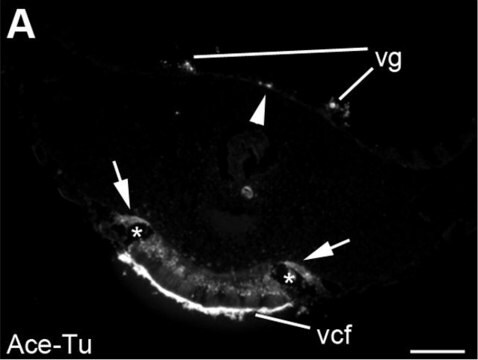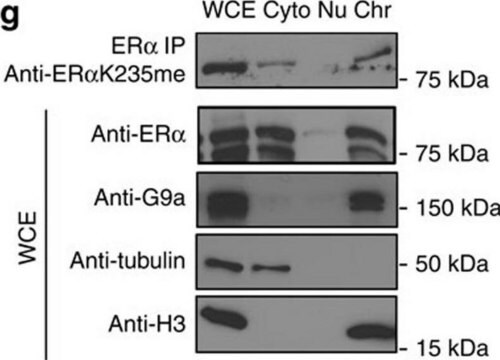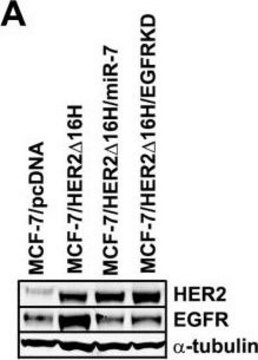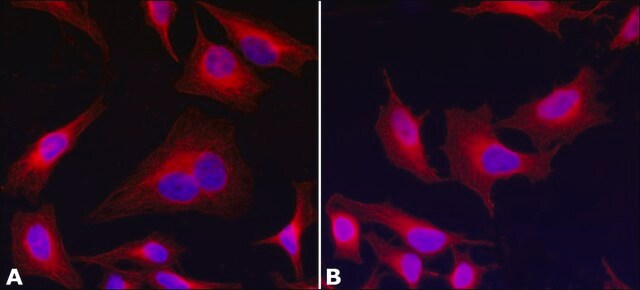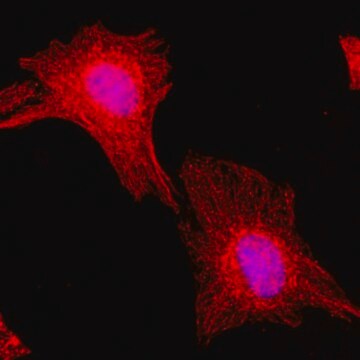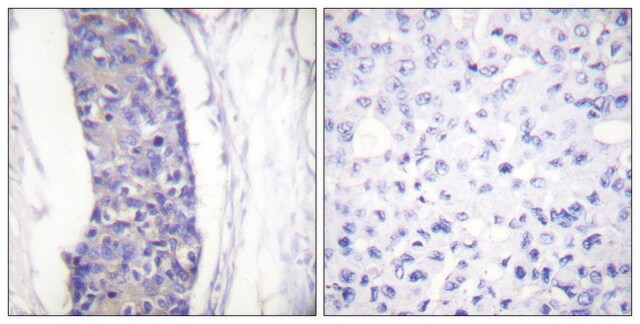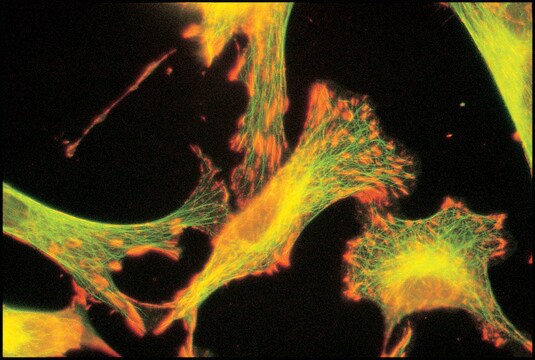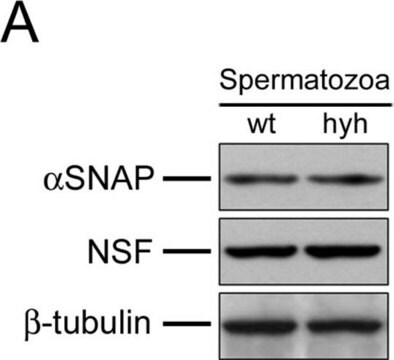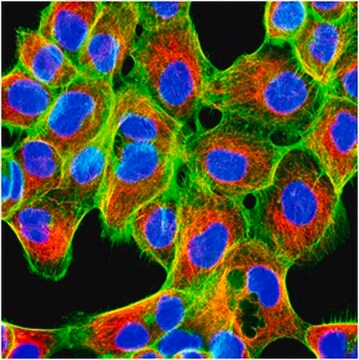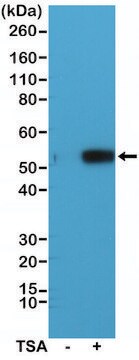T6199
Anti-TUBA4A (TUBA1) Antibody

mouse monoclonal, DM1A
Sinônimo(s):
Monoclonal Anti-α-Tubulin
About This Item
Produtos recomendados
Nome do produto
Anti-α-tubulina monoclonal, clone DM1A, purified from hybridoma cell culture
fonte biológica
mouse
Nível de qualidade
conjugado
unconjugated
forma do anticorpo
purified immunoglobulin
tipo de produto de anticorpo
primary antibodies
clone
DM1A, monoclonal
Formulário
buffered aqueous solution
peso molecular
antigen ~50 kDa
reatividade de espécies
yeast, mouse, amphibian, human, rat, chicken, fungi, bovine
embalagem
antibody small pack of 25 μL
validação aprimorada
independent ( Antibodies)
Learn more about Antibody Enhanced Validation
concentração
~1 mg/mL
técnica(s)
immunocytochemistry: 0.5-1 μg/mL using cultured chicken fibroblasts (CFB)
immunohistochemistry: suitable
immunoprecipitation (IP): suitable
microarray: suitable
western blot: 0.5-1 μg/mL using total tissue extract from chicken gizzard
Isotipo
IgG1
nº de adesão UniProt
aplicação(ões)
research pathology
Condições de expedição
dry ice
temperatura de armazenamento
−20°C
modificação pós-traducional do alvo
unmodified
Informações sobre genes
human ... TUBA4A(7277)
mouse ... Tuba1a(22142)
rat ... Tuba1a(64158)
Procurando produtos similares? Visita Guia de comparação de produtos
Descrição geral
Tubulin is the major building block of microtubules. This intracellular, cylindrical, filamentous structure is present in almost all eukaryotic cells. Microtubules function as structural and mobile elements in mitosis, intracellular transport, flagellar movement, and the cytoskeleton. Tubulin is a heterodimer that consists of α-tubulin and β-tubulin. Both subunits have a molecular weight of approx. 50 kDa and share considerable homology. In addition to α- and β-tubulin, several other tubulins have been identified, bringing the number of distinct tubulin classes to seven. Most of these tubulins have distinct subcellular localization and an emerging diverse set of functions. Out of the seven different tubulins four new members of the tubulin family were identified recently, which consist of δ, ξ, η and ε-tubulin. η and ε-tubulins were discovered by database searches. Microtubular systems contain at least three α-tubulin isoforms. Two isoforms are coded by two α-tubulin genes, which are both transcribed and code for extremely similar proteins. The third isoform is generated by post-translational modification. At least three modifications of tubulin subunits have been described: the phosphorylation of β-tubulin from brain, the removal of the carboxy terminal tyrosine form a-tubulin in vertebrate tissues, and the acetylation of the amino group of lysine(s) in α-tubulin.
α -tubulin, also called tubulin α 4a (TUBA4A), is mapped to human chromosome 2q35. The gene codes for a member of the α -tubulin family, and contains 448 amino acids. α-subunit of tubulin has molecular weight of 50,000.
Monoclonal antibodies recognizing α-tubulin, together with monoclonal antibodies to other tubulin types (β, β-tubulin isotype I +II, β-tubulin isotype III, tyrosine tubulin, and the acetylated form of α-tubulin) provide a specific and useful tool in studying the intracellular distribution of tubulin and the static and dynamic aspects of cytoskeleton.
Especificidade
Imunogênio
Aplicação
Ações bioquímicas/fisiológicas
α-Tubulin or tubulin α 4A (TUBA4A) plays an essential role in cell growth and division. It is also implicated in various cellular processes, such as cell motility, signaling development and cell shape maintenance. Mutation in TUBA4A is associated with the development of various types of cancers, such as oral cancer, breast cancer, rectal cancer, lung cancer and prostate cancer. In addition, variation in the TUBA4A leads to sporadic amyotrophic lateral sclerosis (ALS).
forma física
Nota de preparo
Outras notas
Exoneração de responsabilidade
Não está encontrando o produto certo?
Experimente o nosso Ferramenta de seleção de produtos.
Código de classe de armazenamento
10 - Combustible liquids
Classe de risco de água (WGK)
WGK 2
Ponto de fulgor (°F)
Not applicable
Ponto de fulgor (°C)
Not applicable
Escolha uma das versões mais recentes:
Certificados de análise (COA)
Não está vendo a versão correta?
Se precisar de uma versão específica, você pode procurar um certificado específico pelo número do lote ou da remessa.
Já possui este produto?
Encontre a documentação dos produtos que você adquiriu recentemente na biblioteca de documentos.
Os clientes também visualizaram
Nossa equipe de cientistas tem experiência em todas as áreas de pesquisa, incluindo Life Sciences, ciência de materiais, síntese química, cromatografia, química analítica e muitas outras.
Entre em contato com a assistência técnica
